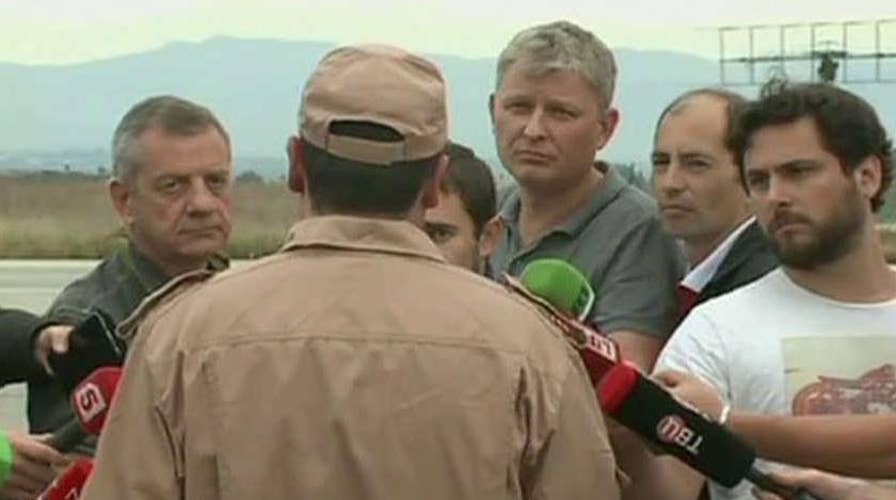Downed Russian pilot: Turkish jets did not issue warnings
Captain was rescued by Russian and Syrian commandos
Russia deployed long-range air defense missiles at its air base in Syria Thursday in a rapid response to the downing of one of its bombers by a Turkish warplane.
Russia's state-owned RIA Novosti news agency, quoting its own reporter on the ground, reported that the shipment of S-400 long-range missiles had been delivered. They will be based in Syria's coastal province of Latakia, just 30 miles away from the border with Turkey and are capable of striking targets within a 250-mile range with deadly precision.
The deployment of the missiles came hours after Turkey released audio recordings of what it says are the Turkish military's warnings to the pilot of the Russian Su-24 bomber that was shot down at the border with Syria early Tuesday.
The recordings indicate that the plane was warned several times that it was approaching Turkey's airspace and asked to change course. The voice is heard saying: "This is Turkish Air Force speaking on guard. You are approaching Turkish airspace. Change your heading south immediately."
Turkey has informed the United Nations that two Russian planes disregarded warnings and violated Turkish airspace "to a depth of 1.36 miles and 1.15 miles in length for 17 seconds.
The plane's surviving pilot has denied that his jet veered into Turkey's airspace "even for a single second"and rejected Turkey's claim that it had issued repeated warnings to the Russian crew. The other pilot was killed by militants in Syria after bailing out, while his crewmate was rescued by Syrian army commandos and delivered in good condition to the Russian base early Wednesday. A Russian marine was also killed by the militants during the rescue mission.
The Kremlin also moved the navy missile cruiser Moskva closer to the shore to help protect Russian warplanes with its long-range Fort air defense system.
"It will be ready to destroy any aerial target posing a potential danger to our aircraft," Russian Defense Minister Sergei Shoigu said at a meeting with military officials. He also announced the severance of all military ties with Turkey and said that from now on, Russian bombers will always be escorted by fighters on combat missions over Syria.
Tuesday's incident was the first time in half a century that a NATO member shot down a Russian plane. If Russia responds by downing a Turkish plane, NATO member Turkey could proclaim itself under attack and ask the alliance for military assistance.
Most observers believe that a direct military confrontation is unlikely, but that the shooting down of the plane will further fuel the Syrian conflict and complicate international peace efforts.
The situation is also alarming because the Russian and Turkish presidents both pose as strong leaders and would be reluctant to back down and seek a compromise.
The announcements came as Russian forces launched a heavy bombardment against Syrian rebel-held areas in Latakia province. At least 12 airstrikes hit the area Wednesday as pro-government forces clashed with fighters from the Nusra Front, which is affiliated with Al Qaeda, and Turkmen insurgents, the British-based Syrian Observatory for Human Rights told Reuters.
The Russian plane's downing has marked a dramatic turnaround in relations between Russia and Turkey, who have proclaimed themselves to be "strategic partners" in the past and developed booming economic ties despite differences over Syria.
Putin described the Turkish action as a "crime" and a "stab in the back," and called Turkey an "accomplice of terrorists." In a sign of the escalating tensions, protesters in Moscow hurled eggs and stones at the Turkish Embassy, breaking windows in the compound. Police cleared the area and made some arrests shortly after the protest began.
Putin has also dismissed Turkey's claim that the Russian warplane intruded its airspace, voicing particular annoyance about Ankara turning to NATO instead of speaking to Russia, "as if it were us who shot down a Turkish plane."
Turkish Prime Minister Ahmet Davutoglu sought to ease tensions Wednesday, calling Russia Turkey's "friend and neighbor" and insisting relations cannot be "sacrificed to accidents of communication." He told his party's lawmakers that Turkey didn't know the plane was brought down Tuesday was Russian until Moscow announced it.
NATO Secretary-General Jens Stoltenberg in turn said that the downing of the plane "highlights the need to strengthen mechanisms to avoid such incidents in the future."
"We should not sleepwalk into unintended escalation," he wrote in an op-ed that is to be published Thursday and was made available to The Associated Press.
Iran meanwhile lashed out at Turkey, with the official IRNA news agency quoting Presidednt Hassan Rouhani as saying Ankara is responsible for the heightened tensions in the region.
The Associated Press contributed to this report.

